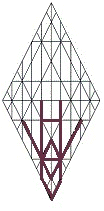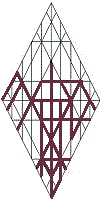נחש
serpent

insinuation, suggestion, a whisper, hiss;
an omen, portent; sorcery;
enchantment, magic; incantation, spell;
a guess, estimation, conjecture;
to predict, divine, foretell;
a snake, copper coil;
distiller, coppersmith.
| There is but one Life. Though those who have passed on and we who live are many, we are One in Wisdom c; for we are as sparks A of the Consuming Fire cA of HaShem hwhy, whose Life we share in our experience of the Universe, which is Yahushua, the Projection/Cry/Shout/ owc of/w Yah/Jah/hy, the Way, the Truth, and the Life. | ||
When Father
Yah
hy created the universe
w by the sound of his Shout
owc as it raced upon the void, divine sparks of
Elohim echoed in its wake; for Yahushua
owcwhy,
the Shout
owc
of
w Yah
hy, is the holy Ember, the Only-Begotten of the
Father; and the spray of sparks that trail his projection throughout all realms
of Creation
fill the Father's mansions with the living, who share his
garments, as parted among themselves, the spiritual garments of all their
forms.
By the Breath of Father
Yah, a particular Life Spark came to its intended rest in the heart of
Adam
mda, the first living soul, in whose
earthly body was encoded the
configuration of material realms, as
determined by the logic of Wisdom. For Adam's outward form had been
fashioned in the similitude, the image, the
pattern of God; and his
inward substance was invested with the likeness of God.
As though from a kiss riding upon the Father's Breath, the Life
Spark
a entered into Adam's bloodstream
md, transforming the created man, making of him a
living soul, a temple fitting for the Only Begotten of the Father: the
indwelling ImmanuAL, God with us; Yahushua, the Shout and Presence of
hy.
By virtue of the operations of the Presence
within him, Adam was reborn, furnished unto all good works. Shall a
woman encompass a man? As though coming to his birth through immaculate
conception, the creature
called Man, in his awakening, became both the Son of Man and the Son of
God.
As Son of the Breath of Father
hy, Adam could no do other than fulfill his
Father's will; for HaShem does all things well by means of the holy fire
of Wisdom that rides within his Breath. His Word does not fall to the ground in
vain, but accomplishes that for which it is intended, as written here .
. . and also . . . there. Written, also, are the words of Isaiah, which
apply to the times of the Garden, to our time, and to all times: "I am hwhy, and there is no other. I form the light and
create darkness, I bring prosperity and create disaster: I, hwhy, do all these things."
 Where,
then, is the garden serpent that so many blame for the temptation
and fall of man? According to the spirit of prophecy found in Isaiah, there is no equivocation
about who or what that might be. Those things that seem to be against us are
actually performing the heavenly Father's will for our good, transient effects
within Earth-time notwithstanding.
Where,
then, is the garden serpent that so many blame for the temptation
and fall of man? According to the spirit of prophecy found in Isaiah, there is no equivocation
about who or what that might be. Those things that seem to be against us are
actually performing the heavenly Father's will for our good, transient effects
within Earth-time notwithstanding.
God is
good; and his fruit, good.
Should it appear otherwise within our flashes of comprehension, the
fault is not God's, nor ours. If fault there is, it lies elsewhere, a
result of the minute, weak-force lull of inertia that asserts itself against the
intervals between cause and effect as, together, all things bend to the
mathematics of Creation, wheels turning within wheels.
Within time or beyond time, it has always been within God's
power to prevent error, as the scripture implies in the brief account of Abimelech's attraction to Sarah, Abraham's sister and wife. God allowed
Abimelech's fancy of Sarai to go only so far, avoiding the confusion the ancient
king's interest might have brought upon us all.
In the Garden parable, however, God chose
not
to prevent error, but allowed the man to make his own choices,
especially with regards to his one command, to see what the man would
do. As the Garden narrative concerning the
Tree of Life
can be considered in many contexts. Whatever conclusions are reached
about God's reasons, it's clear that Adam showed no interest in the garden trees,
except as the place where he walked with God of an evening.
In due course, God gave Adam a gift, knowing that it would not be good for the man to continue his walks alone. It is said of Adam, that male and female, he had created them; so Elohim brought sleep upon the man and separated from him a rib-- a "side chamber" olxh—a faculty capable of making discernments h that would both challenge x and redirect l the man's understandings o: a helpmate, which Adam embraced, taking "Eve" as his wife, declaring her to be bone of his bone and flesh of his flesh.
Had he asked
God for help, the
Father surely would have provided him with a good gift, not a stone. He had not asked,
however, so Adam understood that the gift of Eve came
from the Father's heart, and that the gift would be good and
very good.
Adam was charged with caring for the Garden, and with dressing it—with
deciding what should grow there, and to what extent; but there were
things in the Garden that Adam may not have not noticed. At the least,
there were things there that were either unnoticed or unmentioned until
Eve walked at Adam's side.
Most notable of these was the serpent, which they encountered together
one day before the tree in the midst of the garden. Close reading of the
text makes it unclear whether the Tree of Life and the Tree of Knowledge
are separate trees. My thought is that they are separate understandings
of the same tree, made distinct by discernment of Man, not by a
dualism inherent to the Garden narrative. Whatever the case may be, Eve
clearly discerned the lesser tree as Adam watched and listened to Eve's
encounter with the serpent in silence, even though the Garden was his to tend and rule.
The serpent: he wiggles
n and
stretches
j, inching ever-forward
c. Rising on his tail
n, he climbs upward
j, that he might shake the branches of Man's
vision
c by suggesting
n a scenario
j that is at odds with Wisdom's insistent
c caution that Man abstain from
n the urge
j to partake
c of the lesser tree. While Eve listens,
the subtle serpent
proposes
n an alternative
j that is exciting, enticing, and invigorating c as he hypnotizes the couple in the sway of the
fruit on the tree's branches: “In dying,” he whispered, “they would not
surely die!”
Stalwart Adam did as he had been instructed. He was not moved by the serpent’s argument and did not eat; but Eve, his good wife, was caught in confusion over the commandment, the trees, her husband, and the fruit; and she ate in doubt: she acted upon a guess about the meanings of words and their implications within a context to which she had not given much thought; and she had insufficient regard for the questions then forming in her mind. She had mistaken the serpent's words about eating as permission to disobey the Father's instruction. Doubt, itself, was her temptation; and subjecting herself to conflicted choice by eating was her error.
Deceived by rational thought, Eve was unprepared to receive the words of the serpent as prophecy. Had she not interpreted them as denial of a penalty for eating, Eve might then have perceived the truth that we are, only now, gaining perspective enough to comprehend.
There is only one Life, and the sparks of divinity that fall
from the holy ember of that Life as it spans infinity
cannot die.
At times, soot accumulating on its surfaces might need to be whisked away;
but the Holy Fire, itself, could never fail. Bodies are as lamps; and if
a lamp becomes incapable of hosting the fire that gives it its light,
the lamp is disposable, but the fire is not; and Divine Fire will
continue forever: it is the Wisdom of HaShem.
Knowing the Father's mercy would prevail
beyond any dissolution, Adam understood the mistake Eve had made;
and therefore he also ate, so that Eve wouldn't die alone. A living soul who had
made an oath, Adam sacrificed his immortality on behalf of the helpmate
for whom he had accepted responsibility. Never destined to abide alone,
he also ate, opening the way for the throngs of humanity to share the Life Spark
a
in his Blood
md:
each human, in his order, becoming sons and daughters of an immortal parentage
that had put on mortality.
The great Serpent
n
within the bellows
j
of
the Breath
c—foe
n
or friend
j,
as one might perceive in a passing moment—is charged with raising up
Wisdom's c
children
n.
The serpentine bent of natural man is to prefer that he ascend
j
through reason
c,
that he might proudly earn
n his
way to successive levels
j of
spiritual c
development
n,
while avoiding
j
the indignity of dependency
c.
Gematria
358
jnc:
Wisdom
c confounds
n such efforts
j.
Numerology
43
gm >
34
dl
>
7
z:
Keep faith during the discomfort
m and anxiety that are
intrinsic to the birthing process
g; for they are goads that will teach
l you of what hides in your heart
d, and to what purpose
z.
Targum: As with Nehustan ntcjn, the fiery serpent that mounted the stave in the wilderness before Moses and the People of the Book, to the end that all who perceived him would live, so it is, also, with perception of the holy serpent in the trees of the Garden.
They communed with God in the evenings, walking among the trees of the Garden. If it is the heavenly serpent that speaks to Eve before the lesser tree, the narrative of the vision vouchsafes the salvation of all who offer their souls to Father hy, confessing their inadequacies. HaMashiyach: Messiah owcwhy, the Shout owc—the Projected Word—of w Father hy is the holy serpent n that descends and ascends upon Jacob's Ladder j of Wisdom c.
| Good | ||
|
site |
TrueType Font |
book |